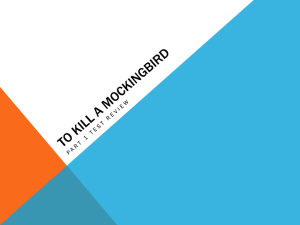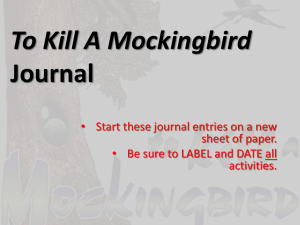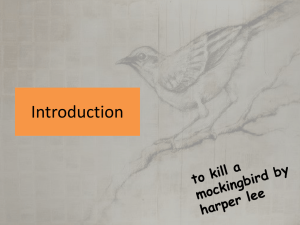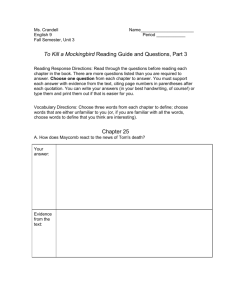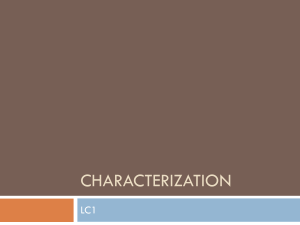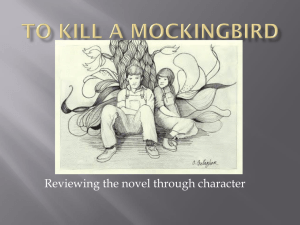chapter 1
advertisement
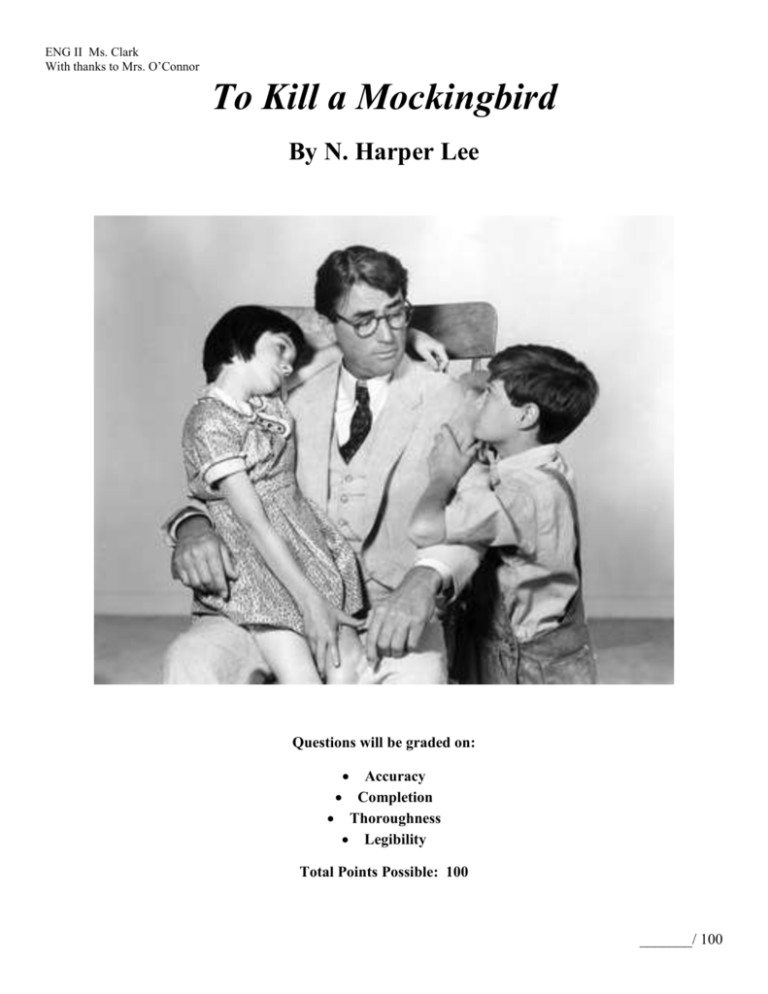
ENG II Ms. Clark With thanks to Mrs. O’Connor To Kill a Mockingbird By N. Harper Lee Questions will be graded on: Accuracy Completion Thoroughness Legibility Total Points Possible: 100 _______/ 100 Character Chart Character Name Scout Finch Jem Finch Dill Harris Atticus Finch Bob Ewell Mayella Ewell Tom Robinson Miss Maudie Calpurnia Boo Radley Primary Role Facts and Character Traits (4 Min.) DIRECTIONS: Answer all questions thoroughly and accurately on separate sheets of paper. CHAPTER 1 1.) Explain how Jem’s arm got broken and why it concerned him at first. 2.) Scout is how many years younger than Jem? 3.) What information do we learn about the history of the Finch family in this chapter? 4.) Who is Dill? (Where does he come from? Why is he in the Finch children’s neighborhood? What is his real name? What famous writer is he supposedly based on?) 5.) The Finch family live in what town, what state, and what county? 6.) What is the history of the Radley family? 7.) What is Boo Radley’s real name? 8.) According to Jem, what is Boo Radley’s form of diet? 9.) Describe Boo Radley according to Jem’s description. CHAPTER 2 1.) What major events happened to Scout during her first day at school? 2.) Why didn’t Miss Caroline’s class like the story about the cats who wore cunning little clothes and ate chocolate malted mice? What does this suggest about these children and this community? 3.) Why did Miss Caroline get upset with Scout? Do you agree with her reasoning? Why or why not? 4.) According to Scout, what was Miss Caroline’s new method of teaching and how did it work? 5.) Describe the incident with Walter Cunningham. Do you think Scout reacted appropriately? 6.) What is “entailment”? How do Jem’s & Atticus’s views differ on this topic? 7.) Is the Finch family poor? CHAPTER 3 1.) What is a haint? 2.) Why can’t Walter Cunningham pass the first grade? 3.) When Walter is eating lunch at the Finch house, why does Scout have to finish eating her lunch in the kitchen? What does this punishment reflect about the rules and dynamics of the Finch household? 4.) What does Atticus mean when he tells Scout that in order to really understand a person, you must climb into his skin and walk around in it? 5.) Why does Scout want to quit school? 6.) Why do some of the children attend only the first day of school and remain at home the rest of the year? 7.) What does Atticus tell Scout about the Ewell family to convince her that she must not use them as an example? 8.) Atticus works out a bargain with Scout which is to be kept secret, especially from Miss Caroline. What is this secret? What does it suggest about Atticus’s style of parenting? Do you think he’s a good father? CHAPTER 4 1.) What was the significance of the knothole in the oak tree? What was found there, and what does it mean? 2.) What does Dill tell Scout and Jem about his father after he arrived on the train? Do you believe what he says? Why or why not? 3.) Jem believed that Boo Radley was probably dead. What did Jem believe the Radley’s had done with Boo’s body? 4.) Jem pushed Scout in the tire very hard. Describe what happened to Scout as a result of her ride in the tire. What are your thoughts about Boo Radley at this point in the story? 5.) What new game do the children begin to play in this chapter? Do you think this is a good game? Why or why not? 6.) For what two reasons does Scout want to quit playing the Radley Game? CHAPTER 5 1.) Why does Scout refer to Miss Maudie as a “Chameleon” lady? (Note: add details about Miss Maudie to your character chart in this chapter!) 2.) How does Miss Maudie seem to feel about Stephanie Crawford and her gossip? How do you know? 3.) What is the difference between a “regular” Baptist and a “Foot-washin’” Baptist? 4.) How were Jem and Dill planning to deliver a note to Boo Radley? 5.) What message was contained in the letter they planned to deliver to Boo? 6.) How does Atticus respond when he discovers the boys’ plan? Is he right to feel as he does? CHAPTER 6 1.) What spectacle did the children observe Mr. Avery performing? (It was not performed ever again as far as they were able to determine.) 2.) What happened when Jem, Dill, and Scout tried to sneak up to the Radley house? How did Nathan Radley describe these events later? 3.) What happened to Jem as he was attempting to escape through the fence? 4.) Why was Jem unable to sleep and why did he finally decide he must return to the Radley’s again? CHAPTER 7 1.) How had Jem found his pants when he returned to retrieve them from the Radley’s fence? What do you think happened? 2.) What did the note that Jem and Scout were going to leave in the oak tree say? Why were they unable to leave the note as they had planned? 3.) For what reason had Mr. Nathan Radley cemented the tree (According to him)? Do you think there was another reason? If so, what was it? 4.) At the end of this chapter, Scout said that Jem had been crying because his face was dirty in the right places. Why do you think Jem was crying? CHAPTER 8 1.) Why are Jem and Scout disappointed when Atticus informed them that Mrs. Radley had died of natural causes? 2.) Why did Scout believe the world was coming to an end? 3.) Jem and Scout decide to buils a snowman with the sparse covering of snow. How does this venture turn out? 4.) For what reason does Atticus tell Jem that he has “perpetrated a near libel in the front yard,” and suggest a disguise? 5.) Miss Maudie contends that Jem and Scout have erected an “absolute morphidite”. Why does she refer to their snowman in such a way? 6.) What happened to Miss Maudie’s house? Why was help so slow? 7.) What strange thing happens to Scout while she and Jem are outside in the cold? What do you think it means? 8.) Why was Jem suddenly compelled to reveal ALL of the children’s secrets, omitting nothing? (knot-hole, pants, etc...) 9.) Even though Miss Maudie had lost nearly everything, she does not seem overly concerned. Why does she accept such a great loss so well? What does this say about her character? CHAPTER 9 1.) Why was Scout going to fight Cecil Jacobs? 2.) What three reasons did Atticus give to Scout for defending Tom Robbins? 3.) Who was cousin Ike Finch? 4.) Who was Francis Hancock? 5.) What was in the long boxes Uncle Jack brought with him when he arrived for Christmas? 6.) What information does Francis reveal to Scout concerning Dill? Does this change your opinion of Dill? 7.) Why does Scout fight Francis? Who is in the right, and why? 8.) Why does Scout believe she had been unfairly treated by Uncle Jack? What does Atticus tell Uncle Jack about dealing with children? 9.) Why is Atticus defending Tom Robinson, knowing that it will not be accepted very well by the general public? Would you have done the same if you were in his shoes? CHAPTER 10 1.) Why do the children (especially Scout) feel that their father could do nothing that could possibly arouse the admiration of anyone? 2.) Atticus told Jem, “I’d rather you shot at tin cans in the back yard, but I know you’ll go after birds. Shoot all the bluejays you want, if you can hit ‘em, but remember it’s a sin to kill a mockingbird.” Why is it a sin to kill a mockingbird? 3.) What is the underlying meaning of the quote from #2? 4.) Who is Tim Johnson? What is wrong with him? 5.) Who is Heck Tate? 6.) Why did Heck Tate insist that Atticus shoot Tim Johnson rather than doing it himself? 7.) Why are the children shocked about Tim Johnson’s fate? What do we learn—especially about Atticus— from this event? 8.) For what reasons did Miss Maudie say Atticus had given up hunting years ago? CHAPTER 11 1.) What did Mrs. Dubose say to Jem and Scout that infuriated them as they attempted to pass her house on their way to town? 2.) What did Jem do on their return from town as they got to Mrs. Dubose’s house? 3.) What did Atticus tell Scout is the one thing that doesn’t abide by majority rule? 4.) What kind of a “deal” did Jem work out with Mrs. Dubose to repay her for the damages he had done? 5.) What is a “nigger-lover”? (As Atticus tried to explain it to Scout) 6.) How did Mrs. Dubose “trick” the children into staying longer and longer each day without them really knowing it? 7.) What had Jem and Scout unknowingly been helping Mrs. Dubose to cure herself of before she died? 8.) For what reasons was Mrs. Dubose determined to be cured before she died? 9.) What is the significance of the Snow-on-the-mountain Camellia Mrs. Dubose sent to Jem the night she died? What message was it to convey to Jem? 10.) Atticus contends that Mrs. Dubose was a great lady, but Jem does not immediately agree. Why did Atticus want Jem and Scout exposed to Mrs. Dubose during that very difficult time in her life? What do you think he hoped they might learn from being exposed to her that would be of benefit to them? CHAPTER 12 1.) Comment on Jem's and Scout's visit to First Purchase church. What happened? What was it like? What do people think/feel about them? How do they feel about this experience? 2.) What new things do Jem and Scout learn here about how African-American people live? 3.) Who is Zeebo? What does Scout learn from Calpurnia's account of Zeebo's education? Specifically refer to literacy. 4.) Explain why Calpurnia speaks differently in the Finch household, and among her neighbors at church. How is language different in a workplace and in a social setting and/or around family? (Try using the vocab word “dialect” in your answer to #4. Here is the definition: “A provincial, rural, or socially distinct variety of a language that differs from the standard language, especially when considered as substandard” (dictionary.com) This is also the term for when a writer spells things “incorrectly” in order to reflect the accent with which a character speaks.) CHAPTER 13 1.) Why does Aunt Alexandra come to stay with Atticus and his family? What is she like? 2.) Read the first two things Alexandra says when she comes to the Finch house. Are these typical of her or not? 3.) Alexandra thinks Scout is “dull” (not clever). Why does she think this, and is she right? 4.) Are all adults good at knowing how clever young people are? 5.) How does Aunt Alexandra involve herself in Maycomb's social life? 6.) Comment on Aunt Alexandra's ideas about breeding and family. Why does Atticus tell them to forget it? Who is right, do you think? CHAPTER 14 1.) Comment on Atticus's explanation of rape. How suitable is this as an answer to Scout, especially given Atticus’s previous admonition to Uncle Jack to always explain things to children? 2.) Why does Alexandra think Atticus should dismiss Calpurnia? How does Atticus respond to the suggestion? 3.) Why is Scout pleased when Jem fights her back? Why is she less pleased when he tells Atticus about Dill? 4.) What do we learn from Dill's account of his running away? 5.) Why is Jem considered a "traitor"? Why is he is also considered a maturing, more responsible young man? CHAPTER 15 1.) Dill has come up with another foolproof plan to make Boo Radley come out. What was Dill’s new plan? 2.) On the Saturday night before the trial of Tom Robinson was to begin (Monday), a group of men come to visit Atticus, among them Heck Tate, Link Deas, Dr. Reynolds, Mr. Avery, and others. What concerns did they express to Atticus that had prompted their visit? 3.) About 10:00 Jem, Scout, and Dill set out to find Atticus. They locate his car in front of the Maycomb bank building, but find he is not in his office. Where did they finally find Atticus and what was he doing? 4.) As the children watch, four dusty cars came in from the Meridian highway and stopped in front of the jail. Who were the men in the cars, and why had they come to the Maycomb County jail? 5.) Why could Atticus not expect any help from Heck Tate? 6.) What did Scout address Mr. Cunningham about? 7.) Why do you think Scout’s conversation with Mr. Cunningham dispersed the crowd? Could anyone other than Scout have achieved the same goal? Why or why not? CHAPTER 16 1.) What “subtle change” does Scout notice in her father? 2.) What sort of person is Dolphus Raymond? What do we learn about Maycomb from the way he is treated? 3.) How does Reverend Sykes help the children see and hear the trial? Is he right to do so? 4.) Comment on Judge Taylor's attitude to his job. Does he take the trial seriously or not? CHAPTER 17 1.) What are the main points in Heck Tate's evidence? 2.) What does Atticus show in his cross-examination of Sheriff Tate? 3.) What do we learn indirectly of the home life of the Ewell family in this chapter? (Note: Be sure to add to the character chart in this chapter!) 4.) What do you learn from Bob Ewell's evidence? 5.) Why does Atticus ask Bob Ewell to write out his name? What does the jury see when he does this? CHAPTER 18 1.) Is Mayella like her father or different from him? In what ways? 2.) What might be the reason(s) for Mayella's crying in the court? 3.) How does Mayella react to Atticus's politeness? Is she used to people being polite? 4.) Do you believe Mayella’s testimony? Is she a victim? If so, of whom? If not, why not? 5.) How well does Mr. Gilmer prove Tom's guilt in the eyes of the reader (you) and in the eyes of the jury? Can you suggest why these might be different? CHAPTER 19 1.) What made Tom visit the Ewell's house in the first place? 2.) What is a chiffarobe? 3.) Why does Scout think that Mayella Ewell was “the loneliest person in the world”? Are you inclined to agree with her? 4.) In your own words, explain Mayella's relationship with her father. 5.) How does Dill react to this part of the trial? Why is this, in your opinion? CHAPTER 20 1.) What does Mr. Raymond offer Dill to settle his stomach? 2.) What did Scout believe was in the bottle? What was really in the bottle? 3.) Raymond says, “You little folks won’t tell on me now, will you? It’d ruin my reputation if you did.” What “reputation” is he talking about? 4.) Why does Mr. Raymond act like he does? 5.) Why did Mr. Raymond entrust Scout and Dill with his secret? 6.) According to Atticus, what is the one American institution in which all men are truly created equal? 7.) What were Atticus’s last words under his breath to the jury? CHAPTER 21 1.) Why was Calpurnia in the courtroom? 2.) What does Jem expect the verdict to be? Does Atticus think the same? 3.) Describe what happened when Atticus left the courtroom. Why did this happen? 4.) What is unusual about how long it takes the jury to reach a verdict? Is the verdict predictable, or not? CHAPTER 22 1.) What did Calpurnia show Atticus the morning after the trial? 2.) Although Atticus did not want his children in court, he defends Jem's right to know what has happened. Explain, in your own words, Atticus's reasons for this. (Look at the speech beginning, “This is their home, sister”. 3.) Why did Miss Maudie feel like the town of Maycomb was making a "step"? 4.) Miss Maudie tells Jem that “things are never as bad as they seem”. What reasons does she give for this view? 5.) Why did Judge Taylor appoint Atticus to Tom’s case? 6.) Why does Dill say that he will be a clown when he grows up? Do you think he would keep this ambition for long? 7.) This story is set in the 1930s, but was published in 1960. The Civil Rights Movement, of which MLK, Jr. was a part, existed roughly between 1955 and 1968. Have attitudes to racism remained the same since the 30s? The 60s? Or have there been any changes (for the better or worse) since then, in your view? Remember that racism doesn’t have to be about African Americans and white people—there are many races living in the US! 8.) Why does Bob Ewell feel so angry with Atticus? Do you think his threat is a real one, and if so, how might he try to “get” Atticus? CHAPTER 23 1.) What do you think of Atticus's reaction to Bob Ewell's challenge? Should he have ignored Bob, retaliated or done something else? 2.) What is “circumstantial evidence”? What has it got to do with Tom's conviction? 3.) What does Atticus tell Scout about why the jury took so long to convict Tom? 4.) Why does Aunt Alexandra accept that the Cunninghams may be good but are not “our kind of folks”? Do you think that people should mix only with others of the same social class? Are class-divisions good or bad for societies? 5.) At the end of this chapter, Jem forms a new theory about why Boo Radley has never left his house in years. What is this? How likely is it to be true, in your opinion? CHAPTER 24 1.) Do you think the missionary ladies are sincere in worrying about the “Mrunas” (a tribe in Africa)? Give reasons for your answer. 2.) Compare the reactions of Miss Maudie and the other ladies when Scout says she is wearing her “britches” under her dress. 3.) What is your opinion of the Maycomb ladies, as depicted in this chapter? 4.) Explain briefly how Tom was killed. What is Atticus's explanation for Tom's attempted escape? Do you agree with Atticus? 5.) What does Aunt Alexandra say about how the town treats Atticus? 6.) How, in this chapter, do we see Aunt Alexandra in a new light? How does Miss Maudie support her? 7.) What is ironic about what the ladies are talking about? (Irony definition from dictionary.com: “an outcome of events contrary to what was, or might have been, expected.”) CHAPTER 25 1.) Why wouldn’t Jem allow Scout to smash the roly-poly she found on the porch? 2.) How did Jem and Dill happen witness Atticus and Calpurnia telling Helen about Tom? What do we learn about the Robinsons from this encounter? 3.) Scout says that, to Maycomb Tom’s death was typical of a black man to cut and run. Take Atticus’s advice and stand in Tom’s shoes. Why did he try to escape from prison when he had a good chance of getting off on appeal? 4.) What does Mr. B.B. Underwood compare Tom’s death to in the Maycomb Tribune? Why? 5.) According to Miss Stephanie, Bob Ewell said that Tom’s death made it “one down and about two more to go.” What did Bob Ewell mean by that? CHAPTER 26 1.) In her lesson on Hitler, Miss Gates says that “we [American people] don't believe in persecuting anyone.” What seems odd to the reader about this claim? (Remember, World War II, when the Nazis fought the Allied forces, didn’t start until the 1940s!) 2.) In regard specifically to the current events assignment, how would a Marxist Critic view this book? Do you think this type of criticism would be valid/ helpful for this text? 3.) Why is Scout puzzled by Miss Gates' disapproval of Hitler? 4.) What did Scout notice about Miss Gates at the trial? 5.) Why does Scout's question upset Jem? Is there a simple answer, or any answer, to the question (“How can you hate Hitler an’ then turn around an’ be ugly about folks right at home?”) CHAPTER 27 1.) What three things does Bob Ewell do that alarm Aunt Alexandra? 2.) Why, according to Atticus, does Bob Ewell bear a grudge? Which people does Ewell see as his enemies, and why? 3.) What was the purpose of the Halloween pageant? What practical joke had persuaded the grown-ups to have an organized event? CHAPTER 28 1.) Describe the evening Scout and Jem took their “longest journey together.” 2.) What discussion do they have on their way to the school? Why would it be significant that Boo Radley is “not home”? 3.) Who did Jem and Scout meet on their way to the school? How does this person come up again when the children are on their way home? 4.) Why didn’t Scout take her costume off for the walk home? 5.) Describe the scene as Scout and Jem are walking home. 6.) Who attacked the Finch children, and what happened to him? 7.) Why had Atticus not brought a chair for the man in the corner? Who might this stranger be? CHAPTER 29 1.) What causes the “shiny clean line” on the otherwise “dull wire” of Scout's costume? 2.) What explanation does Atticus give for Bob Ewell's attack? 3.) What does Heck Tate give as the reason for the attack? 4.) Do you think the sheriff's explanation or Atticus's is the more likely to be true? CHAPTER 30 1.) Who does Atticus think caused Bob Ewell's death? Who is really responsible? 2.) Why does Heck Tate insist that Bob Ewell's death was self-inflicted? In what way is this partly true? 3.) Is Heck Tate right to spare Boo the publicity of an inquest? 4.) What earlier idea does Scout compare Tate’s conclusions to? 5.) How does the writer handle the appearance, at the end of the story, of Boo Radley? Is Boo what you expected him to be? CHAPTER 31 1.) How do the events of the final chapters explain the first sentence in the whole novel? In retrospect, was this a good way to start the novel? 2.) How does Scout make sense of an earlier remark of Atticus's as she stands on the Radley porch? 3.) At the end of the novel, Atticus reads to Scout. Comment on his choice of story. Does it have any connection with themes earlier in the novel and in its ending? 4.) One of the greatest criticisms of To Kill a Mockingbird is that the two central storylines-- Scout, Jem, and Dill's fascination with Boo Radley in Part 1 and the trial between Mayella Ewell and Tom Robinson in Part 2-- are not sufficiently connected in the novel. Do you think that Lee is successful in incorporating these different stories? Were you surprised at the way in which these story lines were resolved? Why or why not?
